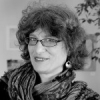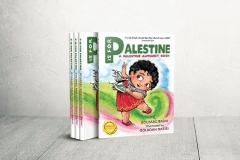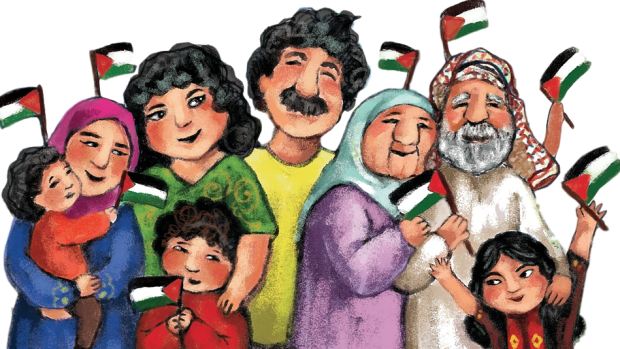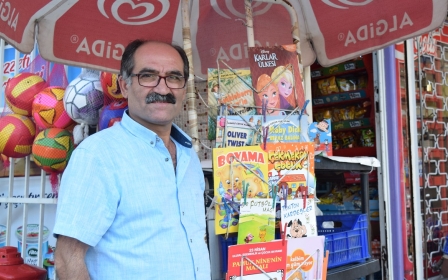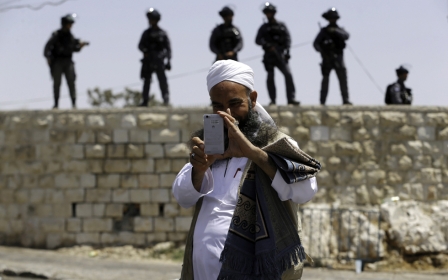P is for Palestine: The children's ABC book pro-Israel bullies tried to ban
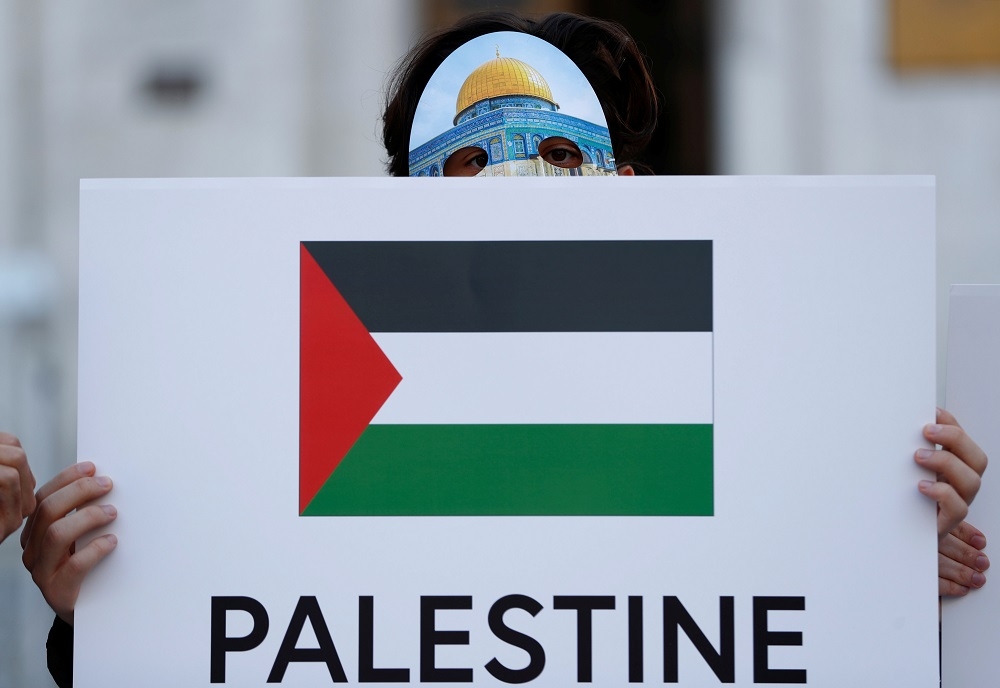
A few lucky children will receive the wonderful new book, P is for Palestine: A Palestine Alphabet Book, this holiday season. Those whose parents have snoozed on placing their order will need to wait till spring of 2018, as the initial print run of 2,000 copies sold out within 10 days of publication.
A second printing is scheduled for next year, and pre-orders are being taken now.
A positive image
The book is a welcome and much-needed addition to English-speaking households who want to provide their children with a positive image of the Arab world, and Palestine in particular.
Stay informed with MEE's newsletters
Sign up to get the latest alerts, insights and analysis, starting with Turkey Unpacked
In the author's words, it is "a book for children of all ages where the story of Palestine is told as simply as the English ABC…in an educational, colourful, empowering way, showcasing the beauty and strength of Palestinian culture".
The author, Iranian-born and New York-based Golbarg Bashi, said she conceived of the idea "when she couldn't find such a book for her own children and for the school visits she regularly conducts in New York City public schools. She's in the habit of buying or borrowing books about cities, countries, and artists whenever she and her family are travelling to those destinations".
Dr Bashi then asked illustrator Golrokh Nafisi if she'd be interested in working on a book about Palestine, and the two soon teamed up, to create the children's book.
A genuine celebration of the historical diversity of Palestine, the book does a stellar job of reminding Westerners, many of whom believe Christianity is a Western religion, that it is Palestine that is the birthplace of Christianity.
Hence, in addition to "B is for Bethlehem", we read that "C is for Christmas, coziest in Jesus Christ's country, with the crunchiest candy," "J is for Jesus", (Jerusalem is referred to by its Arabic name, Al-Quds), and "N is for Nazareth".
But the cheerful little book, in which a curly-haired young girl guides us through her homeland, explaining "D is for Dabkeh", "F is for Falafel", and "K is for Kuffiya", seems to have garnered the wrath of Zionists.
They are particularly incensed by one spread, the letter "I".
"I is for Intifada," the book explains."Intifada is Arabic for rising up for what's right, if you are a kid or a grown up!" and the accompanying illustration is of the young girl on her father's back, raising peace signs behind barbed wire.
Death threats
The author has received death threats, and a handful of rabbis have forced an independent bookstore chain in New York, Book Culture, to issue an apology for advertising the book, thus potentially intimidating other bookstores into not stocking it when the second printing is out.
According to Book Culture's owner, Chris Doeblin, the last time the store faced such threats was decades ago, after Iran issued a fatwa on Salman Rushdie for The Satanic Verses.
According to Book Culture's owner, Chris Doeblin, the last time the store faced such threats was after Iran issued a fatwa on Salman Rushdie
The author's statement insists: "P is for Palestine, and I is for Intifada. It would be irresponsible of an author of a book for Palestinian children (e.g. Native American children) to ignore or whitewash the fact that their people have a resistance movement, most of which is manifested in peaceful protest."
And Dr Bashi continues, defiantly: "My sense of moral responsibility emerged in those refugee camps, not among the self-proclaimed powerful neighbourhoods of New York City who racially profile me, incite hatred and violence against my person and my social-impact start-up, and issue edicts to boycott and shut down bookstores for having dared to sell [the] world's first English language alphabet book on Palestine."
Book Culture's apology, posted on the website of the synagogue which pressured it into apologising for their support of the book, is particularly egregious, when one reads that the store's mission is "to represent as widely as we can the diverse output of the publishing industry - the unique, the scholarly, the under-represented, the under-read."
Only two months earlier, Book Culture was celebrating Banned Books Week, an annual event educating the public on the problems of book censorship.
The apology repeats the contrite verbiage issued by public libraries, universities and theatres around the country that have been bullied into cancelling Palestine justice events, as the owners of Book Culture had to write:
"We regret that we did not fully appreciate the political or communal ramifications of the children's book P is for Palestine by Dr Golbarg Bashi, nor did we anticipate the pain and distress it has caused in our community. We now understand these much better. We oppose terrorism or other forms of violence perpetrated against Israeli civilians during the intifada or thereafter. Any impression from the book to the contrary is not our view. We support Israel's right to exist. We do not endorse the Boycott, Divestment and Sanctions movement (BDS)."
No reference to occupation
Naturally, there is no reference in that apology to the violence and illegality of the Israeli occupation, the decades of Palestinian suffering and losses, nor to the fact that BDS is non-violent resistance.
In the meantime, in a development that shows the power of intersectional alliances against systemic, racist oppression, Jewish allies are expressing their support of the author, and the book, by organising two public readings during Hannukah, one in New York, the other in Philadelphia.
When the book is reprinted in Spring, maybe it should read "A is for Arabic, B is for Bethlehem, C is for Censorship, because Zionists cannot handle pro-Palestinian narratives
The organisers of the New York event explained: "On Sunday, the fifth day of Hanukkah, we will gather to share the gift of story with our children and to celebrate the Palestinian struggle for freedom. The traditional Hanukkah story tells of a small amount of oil that burned for eight days, reminding us that we have enough and challenging us to realise together what is possible."
"Since this book was released," the organisers continue, "there's been an outcry that 'intifada' is a bad word. But it's not: It means rising up to resist injustice. We must all do that now, and in Jewish tradition, Hanukkah is a special time to remember that.
"When the book is reprinted in spring, maybe it should read "A is for Arabic, B is for Bethlehem, C is for Censorship, because Zionists cannot handle pro-Palestinian narratives."
In the meantime, as those of us who have placed orders for the second print await our copy, would current owners of the precious book host more readings, please? World Arabic Language Day, a global celebration of Palestine's language, and of cultural diversity, would be a wonderful opportunity.
- Nada Elia is a Diaspora Palestinian writer and political commentator, currently working on her second book, Who You Callin' "Demographic Threat?" Notes from the Global Intifada. A professor of Gender and Global Studies (retired), she is a member of the steering collective of the US Campaign for the Academic and Cultural Boycott of Israel (USACBI)
The views expressed in this article belong to the author and do not necessarily reflect the editorial policy of Middle East Eye.
Photo: A man wearing a mask with an image of the Dome of the Rock takes part in a Pro-Palestinian demonstration in Istanbul near the OIC summit (Reuters)
Middle East Eye delivers independent and unrivalled coverage and analysis of the Middle East, North Africa and beyond. To learn more about republishing this content and the associated fees, please fill out this form. More about MEE can be found here.


